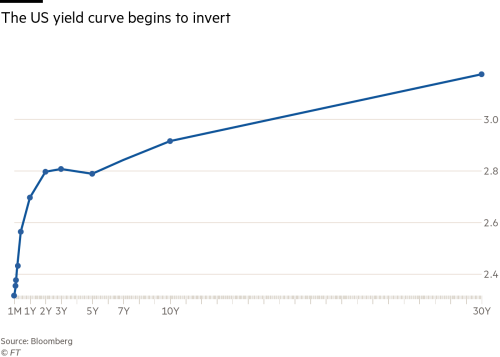
I made a prediction in The tax bill and the U.S. economy in 2018 and beyond that I repeated in Dow falls 1,200+ points as bond yields rise about one of the signs of an upcoming recession.
The most likely would be an inversion of the yield curve, which means that short-term interest rates would rise higher than long-term interest rates. The Federal Reserve has been raising short-term rates for the past two years while long-term rates have been rising much more slowly. If present trends continue, short-term rates will rise above long-term ones within a year or two, which always signals a recession within a year.That prediction starting coming true in October, when the TIPS or Treasury Inflation Protected Securities yield curve inverted. This week, the next shoe fell when the short- and medium-term portion of the yield curve inverted with interest rates on 2-year and 3-year Treasury bonds rising above the rate of return for 5-year bonds. That added to the worry in the stock markets, where all the major indexes fell more than four percent during the week, including a one-day drop of 800 points in the Dow. It also created a lot of chatter on CNBC on Tuesday, most of which mentioned that at least this isn't the yield curve inversion to worry about, which involves the 2-year and 10-year bonds.
I begin with Here's what a flattening yield curve means for the US economy on "Squawk Box," the morning show.
CNBC's Steve Liesman reports on what the yield curve is signaling in terms of a recession. Jim Paulsen of The Leuthold Group joins 'Squawk Box' to discuss.Continuing with "Squawk Box," I'm sharing Cramer says too early to make investments based on yield curve for the graphic showing the actual interest rates for Treasury bonds and Jim Cramer's observations on Larry Kudlow.
CNBC's Jim Cramer joins 'Squawk Box' to weigh in on the flattening yield curve and the Toll Brothers quarterly earnings.I'm not a fan of Cramer's, as he tends to be too bullish and emotional, but I think he's absolutely right about Kudlow; he's too consistently positive to be reliable. Remember, Kudlow is Trump's chief economic advisor, so that's a cause for concern.
CNBC resumed examining the topic on "Power Lunch," the midday program, with Yield curve a good recession indicator: Steve Liesman explains.
CNBC's Steve Liesman explains how the yield curve may indicate recession.CNBC continued talking about the relation among the bond market, stock market, and economy in Yield curve inversion a test for Fed, says expert, where the panel discussed the current inversion involving the 5-year bond instead of the 10-year bond.
CNBC's "Power Lunch" team talks with John Augustine, chief investment officer at Huntington Private Bank, and Paul Christopher, head of global market strategy at Wells Fargo Investment Institute, about what the yield curve inversion may mean for the U.S. economy.The panel on "Fast Money," the late afternoon show, analyzed the financial results of the day in This is the chart that just created widespread panic on Wall Street.
Stocks get slammed as the Dow drops 800 points. What's next? With CNBC's Melissa Lee and the Fast Money traders, Tim Seymour, Brian Kelly, Steve Grasso and Guy Adami.That's enough of one day's talking heads on CNBC, but not the channel's reporting. John Harwood wrote Thursday Donald Trump could be the first president since Jimmy Carter to run for re-election during a recession.
"A strong dollar, weaker growth abroad, mounting corporate debt, a slowdown in housing and the ongoing havoc that tariffs are wreaking on global supply chains are each taking a toll," Diane Swonk, chief economist for Grant Thornton LLP, wrote this week. "No one knows for sure which straw will break the camel's back, only that they are piling up."I made another prediction about the economy in Ten years ago, we were partying like it was 1929. Are we about to do it again?
Swonk has accelerated her previous prediction of recession from the second half of 2020 to the first half. In October, the National Association for Business Economics reported that two-thirds of forecasters it surveyed expect recession by the end of Trump's re-election year.
That would represent a historically rare event – and an ominous one for the president's chances of a second term.
...
The last president burdened with recession as he sought a second term was Carter, in 1980. The results weren't pretty.
Based on New Deal Democrat's analysis at Seeking Alpha, that should happen in the second half of next year, so I'm moving my recession call to between July and December 2019. The bad news is that my readers and I may not know until the middle of 2020. The good news is that it would be perfectly timed to screw up Trump's re-election, should he last that long, or Pence's should he not. I can live with that.The clouds of the next recession are now visible on the radar, but at least they have a silver lining.
No comments:
Post a Comment